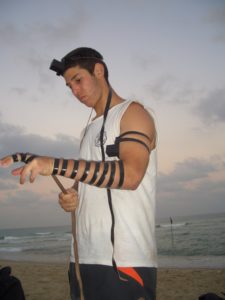From the Tzav-Pesach 2017 issue of Shabbat Shalom, the weekly Torah portion sheet published by Oz Veshalom. The Hebrew version can be foundon the Oz Veshalom website
Haim Watzman
 Each Seder night, at the beginning of the Maggid, the telling of the story of the Exodus, we declare “Ha lahma anya,” “This is the bread of affliction that our ancestors ate in the land of Egypt.” We then make another declaration: “Kol dikhfin,” “Let all come eat, all who are needy come and partake of our Pesach offering.” The first mention of matzah is followed immediately by an invitation to anyone who may be passing by to join us, not just for the holiday meal but also to participate in fulfilling the commandment of telling the story of the Exodus and eating the Pesach sacrifice. The “all” of “kol dikhfin” are at poor people who do not have the means to conduct a Seder themselves. (While most English translations render “Let all who are hungry come eat,” the “who are hungry” is an interpretive gloss not present in the Aramaic.)
Each Seder night, at the beginning of the Maggid, the telling of the story of the Exodus, we declare “Ha lahma anya,” “This is the bread of affliction that our ancestors ate in the land of Egypt.” We then make another declaration: “Kol dikhfin,” “Let all come eat, all who are needy come and partake of our Pesach offering.” The first mention of matzah is followed immediately by an invitation to anyone who may be passing by to join us, not just for the holiday meal but also to participate in fulfilling the commandment of telling the story of the Exodus and eating the Pesach sacrifice. The “all” of “kol dikhfin” are at poor people who do not have the means to conduct a Seder themselves. (While most English translations render “Let all who are hungry come eat,” the “who are hungry” is an interpretive gloss not present in the Aramaic.)
A question immediately arises: why do we make this declaration on Pesach, as part of the ritual? After all, on every holiday, indeed every day, we are subject to the commandments of charity and hospitality.
This invitation to the hungry to sit down at our Seder table caused a measure of discomfort among commentators on the Haggadah. According to the laws of the Pesach sacrifice, a person cannot simply be asked to partake of a particular Paschal lamb. The Torah commands: “But if the household is too small for a lamb, let him share one with a neighbor who dwells nearby, in proportion to the number of persons: you shall contribute for the lamb according to what each household will eat” (Exodus 12:4, New JPS). The Sages learned from this verse that the Pesach sacrifice “is not eaten except by those subscribed to it” (Mishnah Zevahim 5:8). A person needs to have been included in a company of people who have subscribed to the same lamb before it is sacrificed; if he has not, he many not eat its meat at the Seder in fulfillment of the laws of Pesach. If that is the case, how can a person be brought into our Seder at the last minute, after the sacrifice has been made and we are sitting and reading the Haggadah?







